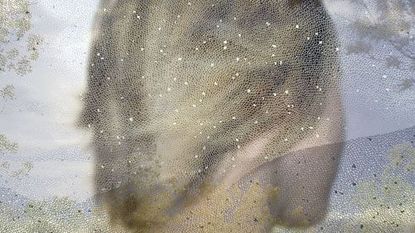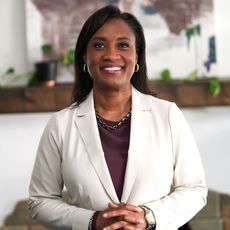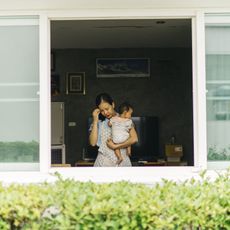
When Jennifer Rainville, then a 32-year-old New York City TV reporter, quit her job in 2007, exhausted by the demanding 24-hour news cycle, she lost her hard-charging professional identity. Falling into a rut of declining invitations and ignoring calls from friends, she became a hermit. When an acquaintance recommended she visit Tony LeRoy, a so-called intuitive who claimed to use his powers of perception to guide clients through difficult times, Rainville was skeptical; she'd never seen a psychic. But LeRoy's professional reputation and sterling client list, including fashion insiders like Isaac Mizrahi, were persuasive. Desperate, she forked over $200 for an hour of "intuitive counseling."
The experience was transformative. "At the first session, Tony said I had a book in me. And he knew the details of my life, like that I was raised by a single mother. He even brought up a spiritual experience I had at age 7 that I'd never revealed to anyone," says Rainville. Buoyed by his vision of her as a successful author, Rainville found an agent, published a novel, and started her own media advisory company in a burst of entrepreneurial energy. "Tony hit a reset button. Now I'm writing my second book, and my business is doing well. He lit a spark I didn't know I had."
Forget Miss Cleo and the Psychic Friends Network. The new wave of low-key professional psychics relies on a finely honed sixth sense to guide clients toward rational choices about their lives and careers. As part of a public relations makeover, they're rebranding themselves as intuitives, highly sensitive people who put their skills to work to enhance clients' lives. Tech-savvy and Web-friendly — brandishing smartphones, using Skype, Facebook, and Twitter accounts in place of crystal balls — they're transforming a moth-eaten gypsy practice into a modern-day tool. And in a post-recession world where people are scrambling for any competitive edge to score a promotion or a job, and relationships fall through the cracks, many results-oriented, high-achieving women find these new gurus a fresh resource, trading recommendations as they would with hairdressers or personal trainers. Especially appealing to this time-pressed clientele? Intuitives deliver specific and practical pieces of advice instantaneously, as opposed to therapy's years-in-the-making revelations.
Laura Day, a bicoastal intuitive who's written six books on the practice, says her no-nonsense approach appeals to her high-profile admirers, including doctors and scientists like Nobel laureate James Watson; driven celebrities such as Jennifer Aniston and Nicole Kidman; and even multimillion-dollar corporations like Seagate, a hard-drive manufacturer that incorporated her input in training sessions to get the company's research and marketing teams collaborating better. "I'm a psychic without the dead people and spirits," says Day, whose no-fuss haircut and black shirtdress on the cover of her recent book, How to Rule the World From Your Couch, is more corporate consultant than occult communer.
Los Angeles — based Deborah Essner made an appointment with Day after the Internet company where she worked as a senior product manager folded. She knew she wanted to leave the industry but had no clue for what. Day predicted Essner's next employer would start with the letter F, and that its logo would be an F within a circle. When she came across a job at Factiva, a business information and research tool whose logo was an F inside a circle, Day's prediction gave Essner the confidence to push harder than she would have otherwise, and she landed the position. Essner, 38, still consults Day, valuing her ability to dislodge submerged sentiments and memories; she and clients like her think of intuitives more as fortune-shapers than traditional fortune-tellers, arming women with the tools for self-actualization. "She holds up a mirror that reveals your hidden intentions and motivations," says Essner. "It's amazing."
Though the techniques they employ differ, intuitive counselors all tout an ability to perceive behavioral patterns and visualize past and future events, saying images pop unbidden into their minds the minute a client walks through the door. L.A.-based intuitive Kaeleya Rayne helps women tease out the meaning hidden in their gut reactions to events around them. So if clients are stressed, Rayne suggests they close their eyes, take a deep breath, and allow a true emotion — like fear or loneliness — to bubble to the surface. Day teaches clients mental exercises to improve personal intuition, recommending they do a series of targeted visualization techniques before bed, when they are most likely to be relaxed. LeRoy sketches a quick portrait reflecting his impressions, drawing large feet on a person he perceives as grounded, or a dash on an area of the anatomy, like the stomach, where he senses a physical or emotional problem.

One former client of LeRoy's, an attractive financial professional, was frustrated by her lack of a steady relationship. When LeRoy asked at what age her problems began, she blurted out "13" — she'd felt like an ugly duckling because of her glasses and bowlegs. This decades-old self-loathing had given rise to her current angst. In one session, they sorted through those feelings, and the woman left reconciled with her younger self. Powered by the force of her epiphany, she was more confident, open, and proactive in her love life than ever before, and within a year, she was married to an old boyfriend.
Stay In The Know
Marie Claire email subscribers get intel on fashion and beauty trends, hot-off-the-press celebrity news, and more. Sign up here.
Marilyn Chase, a 32-year-old L.A.-based casting director, swears by her experiences with Rayne, whom she met in 2009, emotionally leveled by a traumatic breakup with the man she thought she would marry. "Typical talk therapy never worked for me," she says. "I'm good at analyzing myself; therapists didn't add much." Wary of the New Age connotations, she approached her first session with trepidation. But Rayne immediately sensed that Chase had had a bad experience with a man, describing her ex in vivid detail, from his blond hair and blue eyes to his athletic build. "We unpeeled layer after layer [of how I was feeling]. When I left, I felt lighter," says Chase. At a later appointment, Rayne asked whether something pivotal had happened to Chase as an 8-year-old. That was the age at which Chase, a child actor, made her first movie. She loved acting, but when she returned home from filming in upstate California, her friends at school thought she was stuck-up, and shunned her. The incident turned into a lifelong pattern of avoiding risks. With Rayne's help, Chase gathered the confidence to embrace the unknown and launch her own successful casting company.
THE CONCEPT OF A SIXTH sense has intrigued scientists for hundreds of years. David Myers, Ph.D., a professor of psychology at Hope College in Holland, Michigan, and the author of Intuition: Its Powers and Perils, explains that only a tiny portion of what we think we "know" is the product of rational thought. The rest, he says, comes from intuition, the fleeting, unconscious impressions we form about people around us, immediate insights processed without the benefit of logic or reason. Current research into the field uses brain scans and neuroelectrical recordings to track the chemical mechanisms by which intuition occurs in the brain. William Duggan, Ph.D., a senior lecturer at Columbia Business School and an expert on using "strategic intuition" as a business tool, points to seminal studies on the brain cells of sea slugs, which may offer clues to how intuition works in humans. But Duggan and other scientists put little stock in intuitive psychics. "They tell you that things come to them through the ether or from the universe," he says. "All the research shows that it's really learning and memory at work."
Cynics say intuitives, far from possessing special powers of perception, are simply excellent with people, employing techniques such as "cold reading" — picking up on unconscious physical cues — to make their revelations. Quacks and frauds hawking sidewalk palm readings and 1-900-number consultations don't help the industry's reputation, either. Amanda Freeman, the 35-year-old owner of SLT, a Manhattan fitness studio, threw herself a birthday party recently and invited an intuitive to give readings to her friends, but she was disappointed: "He was playing off the crowd, reacting to us rather than 'seeing' anything." Intuitives themselves admit that one bad apple can harm the practice's credibility. Day once visited a psychic healer who was working with several people in the same room. The healer aggressively confronted one woman, a diabetic, accusing her of lacking faith because she was still taking insulin for her condition. "I was sickened," says Day. "A doctor who makes a mistake has a license, and you can sue him. You have to be careful with paraprofessionals." Especially at the going rates. Individuals pay $500 for 45 minutes with Day; businesses shell out $2,500 per hour, or up to $10,000 a month, to be on retainer with her.
But in an age when iPhones, text messages, and Facebook take the place of face-to-face dialogue, perhaps real-time conversations, complete with physical cues, aren't such a bad thing. "There's a perennial, universal appetite for spiritual connection," says Jeremy Sherman, Ph.D., an evolutionary epistemologist at the University of San Francisco. He likens intuitives to the soothsayers of yesteryear and shamans of other cultures, and points out that for career women, "there's a huge premium on anything you can do to reduce uncertainty." Intuitives might be especially useful for those who otherwise lack honest feedback from friends or family about troublesome behavior.
Predictions that come true, of course, are powerfully seductive. "Tony had no idea I wanted to be a writer," says Rainville. "But he 'saw' the book, he said I could do it on my own, and he predicted my consulting business. He helped me become the person I wanted to be." Maybe she needed someone to believe in her. Maybe it was the power of suggestion. Or maybe it was meant to be. Whatever the case, for Rainville, it was an intuition worth paying for.
-
 21 Spring Essentials in Madewell, Banana Republic, and Shopbop's Flash Sales
21 Spring Essentials in Madewell, Banana Republic, and Shopbop's Flash SalesDon’t let these can’t-miss sales pass you by.
By Brooke Knappenberger Published
-
 'Shōgun' Is a Masterpiece—Will There Be More Episodes?
'Shōgun' Is a Masterpiece—Will There Be More Episodes?With those ratings, never say never.
By Quinci LeGardye Published
-
 32 Child Stars Who Have Aged Like Fine Wine
32 Child Stars Who Have Aged Like Fine WineThey made the notoriously bumpy transition to adulthood look easy.
By Katherine J. Igoe Published
-
 36 Ways Women Still Aren't Equal to Men
36 Ways Women Still Aren't Equal to MenIt's just one of the many ways women still aren't equal to men.
By Brooke Knappenberger Last updated
-
 EMILY's List President Laphonza Butler Has Big Plans for the Organization
EMILY's List President Laphonza Butler Has Big Plans for the OrganizationUnder Butler's leadership, the largest resource for women in politics aims to expand Black political power and become more accessible for candidates across the nation.
By Rachel Epstein Published
-
 Want to Fight for Abortion Rights in Texas? Raise Your Voice to State Legislators
Want to Fight for Abortion Rights in Texas? Raise Your Voice to State LegislatorsEmily Cain, executive director of EMILY's List and and former Minority Leader in Maine, says that to stop the assault on reproductive rights, we need to start demanding more from our state legislatures.
By Emily Cain Published
-
 Your Abortion Questions, Answered
Your Abortion Questions, AnsweredHere, MC debunks common abortion myths you may be increasingly hearing since Texas' near-total abortion ban went into effect.
By Rachel Epstein Published
-
 The Future of Afghan Women and Girls Depends on What We Do Next
The Future of Afghan Women and Girls Depends on What We Do NextBetween the U.S. occupation and the Taliban, supporting resettlement for Afghan women and vulnerable individuals is long overdue.
By Rona Akbari Published
-
 How to Help Afghanistan Refugees and Those Who Need Aid
How to Help Afghanistan Refugees and Those Who Need AidWith the situation rapidly evolving, organizations are desperate for help.
By Katherine J. Igoe Published
-
 It’s Time to Give Domestic Workers the Protections They Deserve
It’s Time to Give Domestic Workers the Protections They DeserveThe National Domestic Workers Bill of Rights, reintroduced today, would establish a new set of standards for the people who work in our homes and take a vital step towards racial and gender equity.
By Ai-jen Poo Published
-
 The Biden Administration Announced It Will Remove the Hyde Amendment
The Biden Administration Announced It Will Remove the Hyde AmendmentThe pledge was just one of many gender equity commitments made by the administration, including the creation of the first U.S. National Action Plan on Gender-Based Violence.
By Megan DiTrolio Published